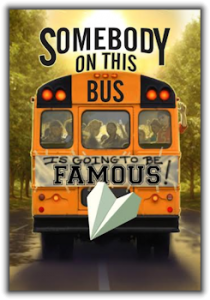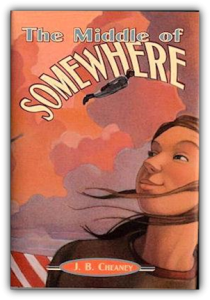
Next week, Sourcebooks, Inc. will be releasing J.B. Cheaney‘s latest book, Somebody On This Bus Is Going to Be Famous. This middle level chapter book was handpicked by the Junior Library Guild for its Fall 2014 selection. Today, I have the pleasure to interview the author, J. B. Cheaney. She shares some information about the writing and publishing process.
In exchange for an honest interview and review, J. B. sent me a copy of Somebody On This Bus Is Going to Be Famous. J. B. is participating in a book giveaway. Remember to leave a comment on this blog so that you will be eligible. Winners must live in the United States.
Welcome J. B. Cheaney
Many people start out pursing one profession and then later choose writing. You were originally involved in theater and then made the transition to writing. How has your background in theater assisted you in your writing endeavor?
I like to see if kids at my school presentations can guess the answer to this question—and often they can. The thing I love most about fiction writing is getting to know the characters, and the only way to do that is to get into their world and act out their initiatives and responses. That’s what I liked about theater: the opportunity to be someone besides myself. Writing a novel is like acting out a play in your head, where you get to play all the parts!
Why did you choose to write books for mid level and middle school audience? What type of messages are you trying to share with this group of readers?
By 1997, I had written four novels for adults that never saw the inside of a cover. That year I started writing The Playmaker with a view to market it for young adults. That was my first novel to be accepted for publication, so I decided God was trying to tell me something. The Playmaker was recommended for readers 10 and up (even though I thought that was a little too young), and I discovered after speaking to some middle-grade school groups that I liked that age. Which surprised me, because those years were my personal worst. My message isn’t really a message; what fiction does best is expand a reader’s experience, and that’s what I hope my books will do for the right readers.
Finding a literary agent and a publisher can be a challenging experience for new authors. Did you have a smooth or bumpy ride? Can you share 3 helpful tips for people who would like to work with a literary agent and traditional publisher?
The best tip, I think, is to try to get something in print before you go looking for an agent or editor. It sounds like a catch-22 because, of course, you want an agent to help you get something in print. But I’m taking about book reviews, newspaper columns, magazine articles—any published work that gets your name on a byline (as long as your name is not also on the masthead) will tell the professional that you’re serious about writing and have what it takes to get published, even if it’s only in the Smalltown Weekly Herald. I’ll admit, I did a little better than that because I used some of my down time between writing unpublishable manuscripts to put together three writing workbooks, which were published by Common Sense Press (Melborne, Florida). Even though they were nonfiction they had sold well enough to make both editors and agents take notice when I began pitching The Playmaker.
How long did it take for you to complete the manuscript for Somebody on the Bus is Going to be Famous? Is the amount of time that you spent on this book similar to your previous books? How many levels of critique and editing occurred before it was presented to your literary agent?
First, a little background: I submitted Somebody on This Bus (let’s just call it SOTB) to my former editor at Random House, and she suggested some changes. But she didn’t accept the rewritten manuscript, nor two other mss. I submitted to her, and I suspected our relationship might be over. There followed a three-year hiatus while I pursued other projects (or that’s what I told myself—I was actually in a slump) and gradually came to the realization that I needed another agent. Moving from one agency to another proved to be the key to restarting my fiction career (note to writers: check your contract. It’s very likely you didn’t sign over all your works in perpetuity, so don’t hesitate to change agents if you need to). My new agent sold SOTB to Sourcebooks/Jabberwocky in less than five months. As for editing, I don’t have a regular critique group but used to meet with a couple of writer friends for critiques (also lunch); they had some useful suggestions for SOTB, as did my agent.
Most of my middle-grade fiction manuscripts take 10-12 months to write, and this was no exception.
Do you encourage beginning writers to belong to a group and/or attend writing conferences?
Networking is becoming more important as the business becomes more impersonal and short-staffed. Agents are increasingly unlikely to respond to your queries unless a) you already have a best-selling novel out there, b) your name is Hillary Clinton or Kim Kardashian or something similar, or c) you met them at a conference. Most of us don’t qualify for a or b, but at some expense of time and money we can manage c.
Editing and revising is a crucial part of the writing process. Did you ask beta readers and/or friends or relatives for their feedback?
I usually don’t—not non-writing friends or relatives, anyway. My former critique group broke up because one of us moved. By now I think my instincts are pretty good, though I may ask for feedback on a technical matter or a critical chapter in the story.
In your acknowledgments, you mention that you never rode a school bus in your youth. Why did you use a school bus as a focal point for your story?
The school bus is the one place where all these kids consistently come together, and I like the idea of showing changes over a single year using a routine, changeless matrix. And of course the bus is a metaphor. For something.
The opening paragraphs are crucial. How did you engage readers in your latest book?
Originally my first chapter began at the chronological beginning of the story, on the first day of school. But I realized that wouldn’t be enough to get the reader involved, especially since I had so many characters to introduce. Readers don’t like getting hit with 8-10 new names in the first five pages. So I decided to open with the ending, so to speak—the single dramatic event that forms the climax of the book, then skip back to the beginning and work forward. The reader already knows that the bus will be involved in a wreck, and will be wondering what happens to each of the characters as she gets to know them better.
The chapters in Somebody on the Bus is Going to be Famous follow the chronology of a school year. How does this format affect the pace of the book?
I’m not sure how it affects the pacing per se, but it creates a mental timeframe that readers of the target age are familiar with and easily conform to.
In the first chapter, multiple characters are introduced. Did you use any literary tools to make it easier to differentiate these people?
I knew this would be challenging. Aside from the trick mentioned above (begin with something striking and dramatic to get the reader emotionally involved), I tried to introduce each character with a distinguishing physical characteristic as well as a personality “type”—the jock, the bully, the drama queen, etc. That creates a mental pigeonhole for each one, an outline which will gradually be filled in according to their individual personalities.
In addition to writing and publishing books, authors need to find time to market their work. What is the best resource that you have used to reach your audience?
Unfortunately, the best resource is one I have little control over– the legions of school and public librarians who pour over review catalogues and spend untold hours reading new books so they’ll know what to recommend. They’re the ones who choose the titles for their states’ reader-choice award lists, and those lists are the best way to get my books into readers’ hands. That’s why I make every effort to visit libraries (and schools, whenever possible) to let them know about my books.
Are you currently working on a new project?
My next novel from Sourcebooks is scheduled for August 2015. It’s historical fiction about the silent movie industry during the last months of World War I. We’re still working on the title—sometimes titles are excruciating!
Is there anything else that you would like to share with my audience?
Somebody On This Bus Is Going to Be Famous is an exercise in telling a story with multiple (nine) points of view. Any writers who are interested in exploring that aspect of the craft should read it!
Book Awards
THE PLAYMAKER (September 2000)
- “Ten Best First Novels For Young Adults, 2001” Booklist magazine
- A New York City Public Library “2001 Best Book for the Teen Age”
- A Bank Street College of Education “2001 Best Book”
THE TRUE PRINCE (October 2002)
- A New York City Public Library “2003 Best Book for the Teen Age”
- A Bank Street College of Education “2003 Best Book”
MY FRIEND THE ENEMY (July 2005)
- “2005 Ten Best Books For Young Readers,” St. Louis Post-Dispatch
- Finalist for the 2005 PEN Center award in Juvenile/Young-adult Fiction
- Scholastic Book Club selection, Winter 2007
THE MIDDLE OF SOMEWHERE (May 2007)
- “Our Favorite Things,” Family Fun Magazine, May 2007
- Washington Post “KidsPost” Book of the Week, August 2007
- BookBuzz (MO Press Association) Book of the Month, August 2007
- Kansas Notable Book, 2008
- Nominated for the 2008-09 Texas Bluebonnet Award
- Nominated for the 2008 Cybil Award, Middle-grade fiction category
- Nominated for the 2009-2010 Florida Sunshine State Young Reader Award
- Nominated for the 2010-2011 Indiana Young Hoosier award
SOMEBODY ON THIS BUS IS GOING TO BE FAMOUS, 2014
- A Junior Library Guild selection, Fall 2014
Book Giveaway
Anyone who leaves a comment on this blog by Sunday, September 21 will be eligible for a book giveaway.J.B. will send the randomly selected winner an autographed hard covered copy of The Middle of Somewhere. The mailing address must be in the US.
Related Blogs
Q & A with Ruth Tenzer Feldman
Sandra’s Bio
Sandra Bornstein is the author of MAY THIS BE THE BEST YEAR OF YOUR LIFE. It is available on Amazon. Sandra’s memoir highlights her living and teaching adventure in Bangalore, India. She is a licensed Colorado teacher who has taught K-12 students in the United States and abroad as well as college level courses. Sandra is married and has four adult sons. The memoir was a finalist in the Travel category for the 2013 Next Generation Indie Book Awards, the 2013 International Book Awards, the 2013 National Indie Book Excellence Awards, the 2013 USA Best Book Awards, and received an Honorable Mention award in the Multicultural Non-Fiction category for the 2013 Global ebook Awards.


I enjoyed the interview with author J. B. Cheaney. Her latest book, Somebody On This Bus Is Going to Be Famous, sounds like it would be a great read aloud book for a middle school classroom.